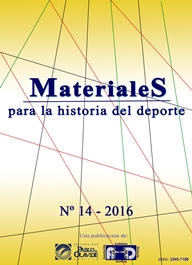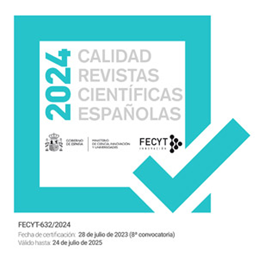Los planes de saneamiento y la conversión de los clubes de fútbol profesionales en Sociedades Anónimas Deportivas (1982-1992)
Palabras clave:
fútbol, España, Sociedades Anónimas Deportivas, mercantilización, Ley del Deporte.Resumen
Dentro del proceso de mercantilización del deporte sufrido en las últimas décadas, el fútbol español experimentó una transformación crítica en los años ochenta y primeros noventa: los futbolistas alcanzaron el estatus de asalariados, se creó la Liga de Fútbol Profesional (LFP) y se multiplicaron los ingresos por retransmisiones con la llegada de las televisiones privadas. Quizás el cambio más significativo fue el de la conversión de los clubes de fútbol en Sociedades Anónimas Deportivas fruto de la Ley del Deporte de 1990. Este cambio fue el resultado del enfrentamiento y la negociación entre los diversos actores, clubes, Federación, Liga y Administración. Los clubes, al borde de la quiebra por las deudas acumuladas, solicitaron en un primer momento un plan de saneamiento por el que recibirían dinero de las quinielas a cambio de control económico. El fracaso del plan llevó a la administración socialista a forzar la conversión en SADs de los clubes, creyendo que se garantizaría una mejor gestión. Aunque los clubes intentaron resistirse al cambio, su enorme deuda les hacía dependientes de lograr un segundo plan de saneamiento, que obtuvieron a cambio de su conversión. Este momento crítico de la historia del deporte español es parte del modelo deportivo español y debe por tanto ser analizado.
Descargas
Referencias
Alcoba López, Antonio. De la ley del fútbol a Barcelona 92. Edited by Esteban Sanz. Madrid, 1992.
Andrews, D.L. & Ritzer, G. “The Grobal in the Sporting Glocal”. Global Networks, 2007.
Bahamonde Magro, Angel. El Real Madrid En La Historia de España. [Madrid]: Taurus, 2002.
Bonaut Iriarte, Joseba. “El eterno problema del Fútbol televisado en España: Una Perspectiva histórica de la lucha por los derechos de retransmisión de la Liga de Fútbol Profesional (LFP)”. Comunicacion y Sociedad 23, no. 2 (2010): 71–96.
Cazorla Prieto, Luis. Las Sociedades Anónimas Deportivas. Madrid: Ediciones ciencias sociales, 1990.
García Candau, Julián. El futbol, sin ley. Madrid: Penthalon Ediciones, 1980.
Giulianotti, Richard. Football. Polity Press, 2000.
Gómez, R. Terol. “Las Ligas Profesionales”. Aranzadi, 1998.
Jarvier, G. “Sport, Culture and Society: An Introduction”, 2013.
Ley Del Deporte. Madrid: Civitas, 1991.
Maguire, Joseph. “Sport, Identity Politics, and Globalization: Diminishing Contrasts and Increasing Varieties”. Sociology of Sport Journal 11, no. 4 (1994): 398–427.
Markovits, A.S. & Hare, G. “Football in France: A Cultural History”, 2005.
Martín Quetglas, Gregorio. Lo Que El Fútbol Se Llevó: Hacienda y el Fútbol: Una Asignatura Pendiente. Valencia: Universitat de València, 2004.
Meier, HE. “Solidarity and Market Power in German Soccer: The Regulation of Collective Selling”. Football Studies, 2003.
Rowe, D. “Sport, Culture & Media: The Unruly Trinity”, 2003.
Sandvoss, C. “A Game of Two Halves”. Football, Television and Globalization. London, 2003.
Simón, Juan. España ’82 : La Historia de Nuestro Mundial. Madrid: T & B, 2012.
Smart, B. “The Sport Star: Modern Sport and the Cultural Economy of Sporting Celebrity,” 2005.
Vilaseca, Josep Lluis. Que Consti En Acta: Memóries. Barcelona: Raval Edicions SLU, Proa, 2014.
Whannel, G. “Fields in Vision: Television Sport and Cultural Transformation”, 1992.
Williams, John M. “The Local and the Global in English Soccer and the Rise of Satellite Television”, 1994, 376–97.
Descargas
Publicado
Número
Sección
Licencia
Aquellos autores/as que tengan publicaciones con esta revista, aceptan los términos siguientes:- Los autores/as conservarán sus derechos de autor y garantizarán a la revista el derecho de primera publicación de su obra, el cuál estará simultáneamente sujeto a la Licencia de reconocimiento de Creative Commons que permite a terceros compartir la obra siempre que se indique su autor y su primera publicación esta revista.
- Los autores/as podrán adoptar otros acuerdos de licencia no exclusiva de distribución de la versión de la obra publicada (p. ej.: depositarla en un archivo telemático institucional o publicarla en un volumen monográfico) siempre que se indique la publicación inicial en esta revista.
- Se permite y recomienda a los autores/as difundir su obra a través de Internet (p. ej.: en archivos telemáticos institucionales o en su página web) antes y durante el proceso de envío, lo cual puede producir intercambios interesantes y aumentar las citas de la obra publicada. (Véase El efecto del acceso abierto).













